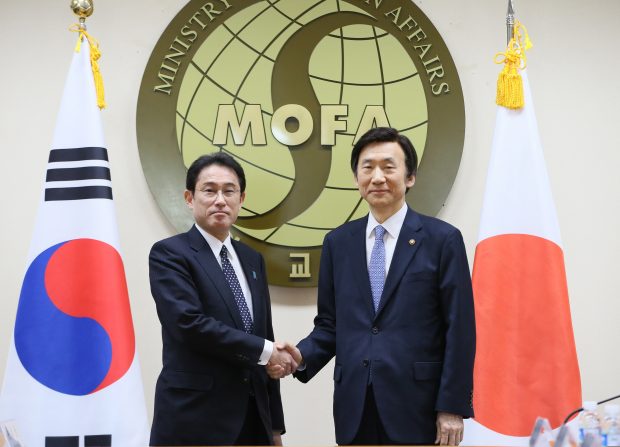1 year later, sex slavery deal on shaky ground

SEOUL, Dec. 28, 2015 (Xinhua) — South Korean Foreign Minister Yun Byung-se (R) and his Japanese counterpart Fumio Kishida shake hands prior to their meeting in Seoul Dec. 28, 2015. South Korea and Japan reached a final, irreversible agreement on Japan’s wartime sex slavery of Korean women, but complaints remained as Seoul failed to extract Tokyo’s acknowledgement of “legal” responsibility for the war crime. (Xinhua/Newsis)
The agreement between Korea and Japan over compensation for women forced into sexual slavery before and during World War II is now on shaky ground with the opposition calling for its renegotiation or abolishment.
On the first anniversary of the deal, Wednesday, the opposition parties asked for Japan to make a sincere apology over its sexual enslavement of Korean women.
The main opposition Democratic Party of Korea (DPK) said the next Korean government should scrap the agreement and negotiate a new one from square one. The second-largest opposition People’s Party claimed Japan should accept liability for its wartime sex crimes.
Calls for scrapping the agreement are growing after President Park Geun-hye, who pushed for it, was suspended following her impeachment by the National Assembly.
Prime Minister Shinzo Abe and other conservative Japanese politicians have said the agreement concludes all related disputes over sexual slavery and Tokyo would no longer apologize.
Refusing to admit Japan’s legal responsibility, Abe’s Cabinet also argued that its offering of 1 billion yen ($8.5 million) to the surviving victims under deal was made for humanitarian reasons.
DPK floor leader Rep. Woo Sang-ho vowed to step up efforts to “scrap the hasty agreement and renegotiate with Japan” if the party succeeds in taking control of the government after the next presidential election.
“Today marks the first anniversary since the disgraceful agreement over sex slavery was made,” he said during a Supreme Council meeting.
Citing that the agreement was made in a “final and irreversible manner,” Woo criticized the Park government for striking the deal unilaterally against the wishes of the majority of Koreans.
“It will be marked as a humiliating moment in Korean diplomacy as the government made the agreement with Japan in return for 1 billion yen,” Woo said.
DPK spokesman Rep. Park Kyung-mee denounced the Park administration as a “puppet of Abe’s Cabinet” and referred to the 1 billion yen as “peanuts” to fool the remaining elderly survivors.
People’s Party spokesman Kim Kyung-rok held a similar view.
“Our government is trying to trade the honor and dignity of the survivors as well as our history for 1 billion yen,” he said. “There can be no final and irreversible agreement with Japan. It must be scrapped and Japan must apologize and bear legal responsibility.”
Analysts assessed that the political relations between the two neighbors have made little progress. They also said bilateral ties can worsen if the opposition wins the election next year.
“The opposition wants to overturn the bilateral deal, which can cause an international dispute,” said Lee Myeon-woo, a senior researcher at the Sejong Institute.
“Also there is slim chance that the ultra-nationalist Abe and even a possible moderate-minded successor will apologize over sex slavery and make legal compensation because what’s done is done.”
Park Won-gon, an international relations professor at Handong University, agreed.
He attributed the latest military cooperation between Korea and Japan, such as the signing of the General Security of Military Information Agreement in November, to the sex slavery deal.
“Although it was controversial, it had a positive influence on security,” he said. “Such efforts are in vain if Korea and Japan fail to mend their political relations.”
The ruling Saenuri Party said the DPK is merely misleading the public on sex slavery-related issues and has no better plan. (Yi Whan-woo, The Korea Times)





















































